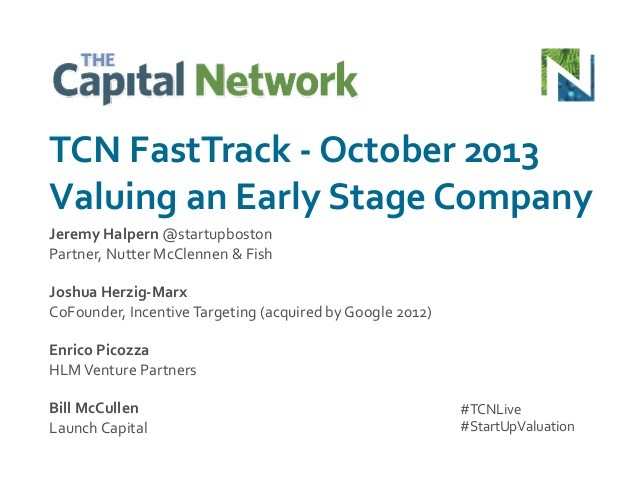Valuing an EarlyStage Company
Post on: 16 Март, 2015 No Comment

Business valuation is traditionally performed when an entrepreneur gets ready to sell an established company. But Neil J. Beaton does valuations of new, venture capital-backed startups. Beaton, author of Valuing Early Stage and Venture-Backed Companies (Wiley Finance, March 2010) and national partner in charge of valuation services at Grant Thornton. spoke recently to Smart Answers columnist Karen E. Klein. Edited excerpts of their conversation follow.
When does a small, privately held company require a business valuation ?
Generally, you need a valuation done any time that you don’t have the expertise to determine your company’s value. But the reality is that people value their companies informally all the time.
For instance, if you bring in $1 million in investment capital and give up 25% ownership to get it, you’ve intrinsically valued your company at $4 million. In reality, all you have is enough money to get through the next round of funding, which may determine if you’re going to be successful or not.
Are there specific triggers for the valuation of a startup?
A small startup might need a valuation when raising a new round of capital, or when it hires a new CEO, or because it got a big sponsor for its Web site, or is getting a bunch of new traffic to its site. That means the company’s value grows—and at the same time it’s typically creating a bunch of stock options.
You specialize in early-stage valuations done for the purpose of granting employee stock options. Why is a valuation needed then?
In 2004 legislation was passed that resulted in IRS code section 409A, which governs deferred compensation. Most stock options are granted for compensation. One of the rules in the code says that if you don’t know the value of your company in accordance with generally accepted valuation principles, you must obtain an independent third-party valuation.
What was the practical result of that rule?
There was a lot of competition between business appraisers. Specialty practices like ours started to work on 409A valuations. That’s because there are various appraisal methods that are unique to early-stage companies, whereas traditional business appraisers have been trained in working with going concerns.
What specifically makes an early-stage valuation different?
Startup companies often have complex capital structures, with both preferred and common stock. That’s where the nuance comes in, because most established companies only have common stock.
What kinds of young companies are you working with these days?
We are dealing with social networking companies, Web-based companies that are venture-backed, raising $1 million to $3 million, usually in a [Series] A round. We did one for a company recently that had been around for four weeks and had already raised $10 million. Most of them have been around three to six months or maybe up to a year.
Do you work with companies all over the country?
We do, but 90% of our work is still performed in Silicon Valley. The hottest area outside of Silicon Valley is the Wisconsin Biotechnology Center at the University of Wisconsin at Madison.
What are some of the conflicts that arise during a valuation?
Business owners want to value their companies as low as they can for stock option purposes, but as high as they can when they’re out raising capital. Also, sometimes egos get in the way. A CEO might say, My company’s worth $10 million. But then their staff will get options valued at that level and they’ll really have to work hard to get the value up by the time they sell the company, or they’ll have some very unhappy people.
How much time and money does an early-stage valuation require?
The typical turnaround is four to six weeks and the cost is $5,000 to $10,000. If you need a valuation in two weeks, I can do that, but it’s tough. Some of the timing depends on how sophisticated the company is itself. Many early CEOs don’t really know about the financial part and haven’t hired a CFO.
Where would a startup entrepreneur go to get an early-stage valuation done?
The venture capital team usually has an experienced attorney working with them. That person, if they’re savvy, will know how to find a valuation firm and put the deal together.














